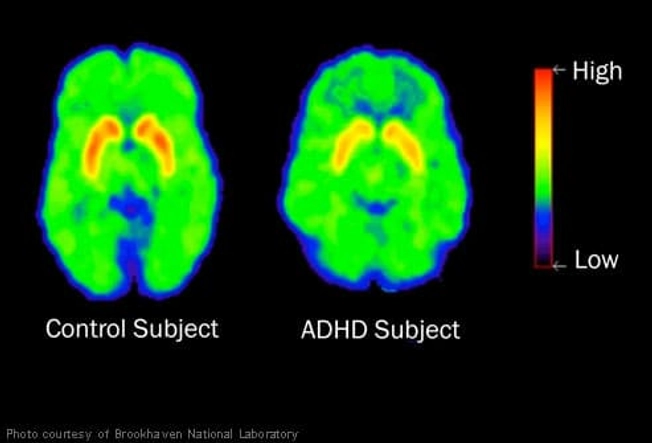- Overview
- Symptoms
- Causes & Risks
- Tests & Diagnosis
- Treatment
- Living With
- Complications
- View Full Guide
A Visual Guide to ADHD in Adults


ADHD Affects Adults, Too
Attention deficit hyperactivity disorder is not limited to children -- 30% to 70% of kids with ADHD continue having symptoms when they grow up. In addition, people who were never diagnosed as kids may develop more obvious symptoms in adulthood, causing trouble on the job or in relationships. Many adults don’t realize they have ADHD, leaving them mystified about why their goals seem to slip out of reach.

Signs of Adult ADHD: Running Late
ADHD in adults follows a slightly different pattern than in children. Adults may be chronically late for work or important events. Adults may realize that their tardiness is undermining their goals, but they just can't seem to be on time.

Signs of Adult ADHD: Risky Driving
One of the hallmarks of ADHD is difficulty keeping your mind on the task at hand. That spells trouble for teens and adults when they're behind the wheel of a vehicle. Studies show that people with ADHD are more likely to speed, have accidents, and lose their drivers' licenses.

Signs of Adult ADHD: Distraction
Adults with ADHD may have trouble prioritizing, starting, and finishing tasks. They tend to be disorganized, restless, and easily distracted. Some people with ADHD have trouble concentrating while reading. The inability to stay focused and follow through on tasks can derail careers, ambitions, and relationships.

Signs of Adult ADHD: Outbursts
Adults with ADHD may have problems with self-control. This can lead to:
- Difficulty controlling anger
- Impulsive behaviors
- Blurting out rude or insulting thoughts

Signs of Adult ADHD: Hyperfocus
Some adults with ADHD can focus intently on things they enjoy or find interesting -- the ability to hyperfocus. But they struggle to pay attention to tasks that bore them. The trouble is that many tasks necessary for success in everyday life are dull, from making a grocery list to filing documents at work. People with ADHD tend to put off boring tasks in favor of more enjoyable activities.

Multitasking or ADHD?
It may seem like everyone has ADHD these days, as we respond to text messages, email, calls, and fast-paced work environments. While all of this can be distracting, most people manage to focus on important responsibilities. In people with ADHD, distractions interfere with the completion of vital tasks at home and at work.

ADHD or Something Else?
If you are often restless and have trouble concentrating, don't jump to the conclusion that you have ADHD. These symptoms are also common in other conditions. Poor concentration is a classic sign of depression. Restlessness or anxiety could indicate an overactive thyroid or anxiety disorder. Your health care provider will investigate whether these conditions could be causing your symptoms instead of -- or in addition to -- ADHD.

What Causes ADHD?
In people with ADHD, brain chemicals called neurotransmitters are less active in areas of the brain that control attention. Researchers don't know exactly what causes this chemical imbalance, but they think genes may play a role in ADHD, because itoften runs in families. Studies have also linked ADHD to prenatal exposure to cigarettes and alcohol.

An Evolutionary Advantage?
One genetic variation that causes ADHD-like traits is more common in the world's nomadic peoples. Researchers think that traits such as impulsive behavior, novelty-seeking, and unpredictability might help nomads track down food and other resources. So the same qualities that make it challenging to excel at a desk job may have been an advantage to nomadic ancestors.

Diagnosing ADHD in Adults
Many adults don’t learn that they have ADHD until they get help for another problem, such as anxiety or depression. Discussing poor habits, troubles at work, or marital conflicts often reveals that ADHD is at fault. To confirm the diagnosis, the disorder must have been present during childhood, even if it was never diagnosed. Old report cards or talking with relatives can document childhood problems, such as poor focus and hyperactivity.

Testing for ADHD
During an evaluation for ADHD, some mental health professionals use neuropsychological tests. These can include timed, computer-based tests that measure attention and problem-solving skills. Neuropsychological testing is not needed to make a diagnosis, but it can shed light on how ADHD affects a person's daily life. It can also uncover coexisting conditions, such as learning disabilities.

Complications of Adult ADHD
Coping with the symptoms of adult ADHD can be frustrating in itself. At the same time, many adults with ADHD struggle with depression, anxiety, or obsessive compulsive disorder. They’re also more likely to smoke or abuse drugs. People with ADHD can limit these problems by seeking proper treatment.

Medications for ADHD
The most common medicines for ADHD medicines for ADHD are stimulants. It may seem ironic that people who are restless or hyperactive get help from stimulants. These drugs may sharpen concentration and curb distractibility by fine-tuning brain circuits that affect attention. If stimulants don't help enough, your doctor may prescribe an antidepressant to stabilize mood or a selective norepinephrine reuptake inhibitor, such as atomoxetine, which can help control impulsive behaviors.

How Effective Are ADHD Drugs?
There have been far fewer studies of ADHD drugs in adults than in children, but the research to date is promising. Studies have shown adults taking stimulants have fewer ADHD symptoms -- and some people may feel they can concentrate better within about 30 minutes.

Counseling for ADHD
Most adults with ADHD improve when they start medication, but they may continue to struggle with poor habits and low self-esteem. Counseling for ADHD focuses on getting organized, setting helpful routines, repairing relationships, and improving social skills. There is evidence that cognitive-behavioral therapy is particularly helpful in managing problems of daily life that are associated with ADHD.

Adult ADHD on the Job
Holding down a job can be tough for people with ADHD. They often have trouble breaking down tasks and following directions, staying organized, and making deadlines. They’re also prone to tardiness and careless mistakes. In one national survey, only half of adults with ADHD were employed full time, compared to 72% of adults without the disorder. People with ADHD also tend to earn less than their peers.

Careers for Adults with ADHD
There's not much research yet into the careers where people with ADHD are likely to thrive. But ADHD expert Russell A. Barkely, MD, says his patients have excelled in sales, acting, the military, photography, athletic coaching, and many trade professions. A person with ADHD can pursue almost any career that interests them.

Job Coaching for ADHD
People with ADHD may be able to boost their job performance with coaching or mentoring. The mentor will help with organization skills, such as taking notes, keeping a daily planner and prioritizing a to-do list. A quiet workspace with few distractions may help. ADHD is a disability under the Americans with Disabilities Act. This means employers must make adjustments to support a worker’s needs.

Adult ADHD and Marriage
ADHD can sabotage marriage and other relationships. The condition makes it difficult to remember social commitments, birthdays, or anniversaries, finish household chores, and pay bills on time. Adults with ADHD may lose their tempers easily or engage in reckless behavior. This leads to higher rates of separation and divorce.

Life Coaching for ADHD
Like having a mentor in the workplace, some people with ADHD benefit from having a coach for everyday life. Coaching is generally a supplement to more formal psychological counseling. The mentor helps the patient put newly learned skills into practice in real-life situations, whether organizing the home or planning a trip.

Organizational Skills for ADHD
Smart phone "organizer" apps can be especially useful for people with ADHD. Use an app to create a new to-do list every night, and you'll always have it with you on your phone. Keep your list organized by using four categories: calls, emails, tasks, and errands. Other apps can help you keep your schedule up to date, so you won't miss important events.

Diet Tips for Adults with ADHD
Some experts believe foods that provide quality brain fueld could reduce symptoms of ADHD. High-protein foods, including nuts, meat, beans, and eggs, may improve concentration. Replacing simple carbs with complex carbs, like whole-grain pasta or brown rice, can help ward off mood swings and stabilize energy levels.

Does Sugar Worsen ADHD?
The idea that sugar makes people hyperactive is popular, but there is no evidence that sweets cause ADHD or make its symptoms worse. Research in children indicates switching to a sugar substitute, such as aspartame, does not reduce symptoms of ADHD.

Outlook for Adults With ADHD
Adults with ADHD don’t outgrow the condition, but many learn to manage it successfully. Long-term treatment can reduce problems at home and at work, bringing patients closer to their families and their professional goals.
IMAGES PROVIDED BY:
(1) White Packert/The Image Bank
(2) PM Images/Taxi
(3) Michael Krasowitz/Photographer’s Choice
(4) PeopleImages / Getty Images
(5) Fuse
(6) WIN-Initiative
(7) Jetta Productions/Blend Images
(8) ZenShui/Frederic Cirou
(9) Courtesy of Brookhaven National Laboratory
(10) Ian Griffiths/Robert Harding World Imagery
(11) Ed Kashi / Corbis
(12) William King/The Image Bank
(13) Purestock
(14) Chris Gallagher / Photo Researchers, Inc.
(15) Peter Dazeley/Photographer’s Choice
(16) Geoff Manasse / Photodisc
(17) Ron Chapple / Photolibrary
(18) Vicky Kasala/Photodisc
(19) Medioimages / Photodisc
(20) Sean Justice / Digital Vision
(21) Peter Dazeley/Photographer’s Choice
(22) Purestock
(23) Dorling Kindersley
(24) Jamie Grill/Blend Images
(25) Purestock
SOURCES:
Cleveland Clinic: "ADHD in Adults."
Reimer, B. Journal of Traffic Injury Prevention, September 2007.
National Resource Center on ADHD: "Diagnosis of ADHD in Adults."
Hormone Health Network: "Thyroid Problems."
Williams, N. The Lancet, October 2010.
National Institute of Mental Health: "Attention Deficit Hyperactivity Disorder."
UptoDate.com
U.S. National Library of Medicine: "Drug Class Review: Pharmacologic Treatments for Attention Deficit Hyperactivity Disorder."
Medline Plus: "Atomoxetine."
National Collaborating Centre for Mental Health (UK): " Attention Deficit Hyperactivity Disorder: Diagnosis and Management of ADHD in Children, Young People and Adults."
Biederman, J. Journal of Clinical Psychiatry, April 2006.
The New York Times, February 2011.
CDC: "Symptoms of ADHD."
American Medical Association: "New Analysis Cites Economic Impact of ADHD," Sept, 2004.
Kessler, R. The American Journal of Psychiatry, April 2006.
Searight, H. American Family Physician, November 2000.
Nancy Ratey, EdM, author, The Disorganized Mind: Coaching Your ADHD Brain to Take Control of Your Time, Tasks, and Talents.
National Resource Center on ADHD: "Complementary and Alternative Treatments."
Eisenberg, T. BMC Evolutionary Biology, March 2008.